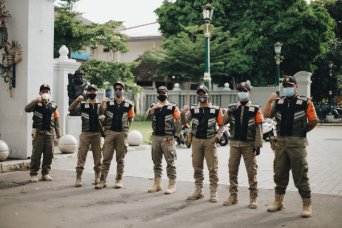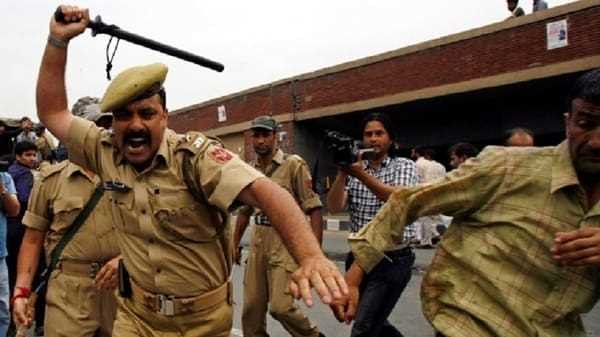- About
- Topics
- Picks
- Audio
- Story
- In-Depth
- Opinion
- News
- Donate
- Signup for our newsletterOur Editors' Best Picks.Send
Read, Debate: Engage.
| topic: | Political violence |
|---|---|
| located: | Indonesia |
| editor: | Leo Galuh |
A smartphone footage from the devastating football match in Indonesia shows a young fan of the East Java football team, Arema Malang, begging the police to stop firing tear gas into the crowd. At first, one officer made the good gesture of ceasing. However, as shown by Indonesian Kompas TV on its official YouTube account, more police officers surrounded and scolded him.
FIFA, the world's governing body of football, has introduced some best-practice guidelines for match officials and police officers. The FIFA Stadium Safety and Security Regulations unequivocally state that no firearms or "crown control gas" may be carried or used on the premises. Furthermore, the 108-page regulation states that both stewards and/or police officers must maintain the lowest possible profile. This includes not wearing aggressive equipment such as helmets, face masks, shields and other similar items.
In fact, the investigation by the Washington Post reported that the police officers shot at least 40 rounds of tear gas at the massive crowd in a 10-minute period. The consequences were devastating: 131 people lost their lives, many due to asphyxia or were trampled since some of the exit gates were locked from outside. Tragically, 17 of the casualties were children.
Even as Indonesian Police Chief General Listyo Sigit Prabowo has named six suspects responsible for the football stampede, only three police officers were mentioned in the suspect list. These three police officers can be said to be mid-rank officers in the East Java province. Meanwhile, the real shooters, until today, have not been mentioned yet as suspects. This indicates an impunity for low-ranking officers since they do not assume the consequences of their actions against the crowd.
This is not the first time Indonesian police have taken brutal and excessive power against civilians. In 2019, the police allegedly took ten people’s lives after the country’s presidential election, as reported by Al Jazeera. The country’s human rights commission accused the police of using excessive force against protesters. Nevertheless, until today there has been no report condemning the culprit of such an unlawful killing.
Meanwhile, the Indonesian government will recruit around 9,000 new police officers in 2022, as reported by Kompas. Anyone who has finished their high school degree is able to join this recruitment pool and will be trained as a police officer for seven months, according to Indonesian Police Education Curriculum. However, the participants will spend 4.5 months of physical training compared to the total duration, instead of developing their intellectual and emotional quotient. Meanwhile, Jacqui Baker, a political economist at Murdoch University in Perth, Australia, said that prior to the deadly stampede in East Java, Indonesian police behaviour reflects a toxic combination of inadequate training and impunity.
Indonesian police are known for their brutality, violence and arrogance toward their citizens. When dealing with civilians, these toxic cultures are deeply rooted in their minds. As a result, there is a probability in the future that civilians will engage in some form of resistance.
According to a Crisisgroup report, at least three cases of community rage-attacks were carried out on police stations in several provinces of the country between 2010 and 2011, which were the result of complaints of excessive use of force.
Therefore, an internal police reform is absolutely necessary to change this toxic culture. This should include their curriculum system such as daily life, paradigms, characters and culture. Police must also change their measurement on crowd control and prevent fatal actions towards citizens.
The Indonesian government, led by President Joko Widodo, can certainly demonstrate its commitment to civilian protection by cutting the police budget next year. According to Andri Prasetiyo, a finance and policy researcher who has analysed years of government procurement data, the country has spent approximately $217.3 million on aggressive equipment such as helmets, tear gas, shields, tactical vehicles and other items used for crowd control over the last decade.
Moreover, the Indonesian police needs to reform its internal human resources problem. As of 2021, Indonesia is one of the countries with the most police officers in the world, totaling 434,135 officers. As a unit or individual, they lack attention and appreciation from the top-level officers. Many of them, particularly the middle-ranking officers, serve in the same position for years due to unplanned and unclear career paths. According to MarkPlus’s recommendation after conducting a survey in 2019, the Indonesian Police needs to focus on human resources management - even halting recruitment if necessary.
Image by Farhan Abas

